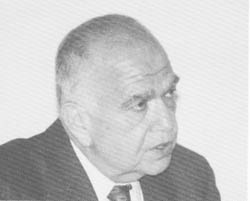Staff Report
Dr. Richard Hovannisian, Professor of Armenian and Near Eastern History and Holder of the Armenian Educational Foundation Chair in Modern Armenian History at the University of California, Los Angeles (UCLA), has been appointed, for the Fall 2000 semester, as the first incumbent of the Henry S. Khanzadian Kazan Visiting Professorship in Armenian Studies at Fresno State.
 Dr. Hovannisian will be teaching one three unit course, Armenian Studies 105, Armenian Genocide in Comparative Context, which will be offered on Monday evenings, from 3:00-6:00 PM. The Fall 2000 semester begins on Monday, August 28.
Dr. Hovannisian will be teaching one three unit course, Armenian Studies 105, Armenian Genocide in Comparative Context, which will be offered on Monday evenings, from 3:00-6:00 PM. The Fall 2000 semester begins on Monday, August 28.
The course will review the theory and characteristics of genocide, and especially focus on the Armenian Genocide as an example of genocide in the 20th century. In addition to the course, Dr. Hovannisian will give three public lectures on a single topic, which will later be published as a monograph.
Dr. Hovannisian bring years of teaching and research experience to the position and it is especially significant that he will be teaching the course in the year 2000, which marks the 85th anniversary of the Armenian Genocide.
Dr. Hovannisian is the first appointee to the Kazan Visiting Professorship, and each year a new scholar will be invited to teach. Dr. Hovannisian was born and reared in Tulare, California, and received his B.A. and M.A in history from the University of California, Berkeley, and Ph.D. in history from UCLA. A member of the UCLA faculty since 1962, he has organized both the undergraduate and graduate programs in Armenian history at the university and has guided a number of students to the Ph.D. degree and an active academic career. He served as the Associate Director of UCLA’s Center for Near Eastern Studies from 1978 to 1995.
Dr. Hovannisian is author of Armenia on the Road to Independence (1976), and the four-volume comprehensive study titled The Republic of Armenia (1971-1996). He has edited and contributed to The Armenian Image in History and Literature (1981); The Armenian Genocide in Perspective (1986); The Armenian Genocide: History, Politics, Ethics (1992); Remembrance and Denial: The case of The Armenian Genocide (1998); and Enlightenment and Diaspora: The Armenian and Jewish Cases (1999). In 1997 he contributed three chapters: The Armenian People from Ancient to Modern Times. He has scholarly articles on Armenian, Caucasian, and Near Eastern history.
Professor Hovannisian is a Guggenheim Fellow and has received many honors for his scholarship, civic activities, and advancement of Armenian studies. He is a founder and three-time president of the Society for Armenian Studies and serves on the editorial boards of five journals and on the boards of directors of ten scholarly and civic organizations. He has given hundreds of lectures and participated in numerous international forums and in the media of Armenian issues. He is listed in the Who’s Who of the World and Who’s Who in America, as well other biographical volumes. He represented the State of California on the Western Interstate Commission for Higher Education from 1978 to 1994, and has served as a consultant to the California State Board of Education, authoring the chapter on the Armenian Genocide in the State’s Social Studies Model Curriculum on Human Rights and Genocide.
Richard Hovannisian was awarded the Medal of Mesrop Mashtots by His Holiness Karekin II of the Great House of Cilicia in 1982. In 1990, he became the first social scientist living abroad to be elected to the Armenian National Academy of Sciences, and he has received honorary doctorate degrees from Yerevan State University (1994) and Artsakh (Karabagh) State University (1997). In May 1998, on the occasion of the eightieth anniversary of the founding of the first Armenian republic, he was awarded the Movses Khorenatsi medal by President Robert Kocharian.
For more information on the course, please contact the Armenian Studies Program office at 559-278-2669.
 Hye Sharzhoom Armenian Action
Hye Sharzhoom Armenian Action